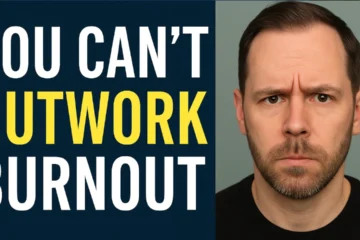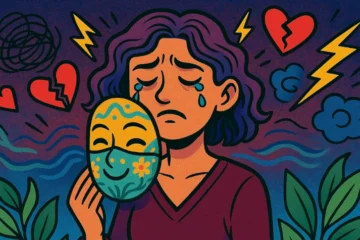If you have ADHD and struggle with anxiety, rejection or trauma, you’ve probably tried everything to get relief. Therapy. Productivity hacks. Meds. Mindfulness. Maybe even alternative healing.
And yet… you’re still stuck.
The truth? Most of the “solutions” out there aren’t designed for the way your brain actually works. In fact, some of them are making things worse.
Here’s why.
❌ Mistake #1: Thinking More Self-Awareness Will Fix the Problem
💬 “If I just understand myself better, I’ll be able to control my emotions.”
This is the trap so many ADHDers fall into—reading books, watching endless YouTube videos, taking online courses on productivity, anxiety, trauma healing.
And while knowledge is important, it’s not change.
Because here’s the problem:
🔥 Knowing why you react a certain way doesn’t stop the reaction from happening.
You can be completely aware that RSD is making you overanalyze a conversation, fully understand that your procrastination is rooted in fear, and still…
💥 Feel like you have no control over it.
Self-awareness is just step one. But most people get stuck there, mistaking knowledge for transformation.
❌ Mistake #2: Using Logic to Fight an Emotional Problem
🧠 “Just remind yourself that it’s not personal! Challenge your negative thoughts!”
Sounds good in theory, right? But if you’ve ever tried to “rationalize” your way out of an emotional meltdown, you already know how useless this advice is.
Here’s why:
🔥 Your brain doesn’t process rejection, stress, or trauma with logic—it processes it with emotion first.
By the time your logical brain kicks in to say, “Hey, they’re probably not mad at you”, your nervous system is already in fight-or-flight mode. Your heart is racing. Your stomach is in knots. You’re spiraling.
At that point, no amount of “thinking differently” is going to snap you out of it.
Because emotions aren’t logical. And trying to solve an emotional problem with logic is like trying to put out a wildfire with a garden hose.
❌ Mistake #3: Thinking You Just Need More Discipline
💪 “If I just push harder, I can overcome this.”
This one is brutal, because ADHDers are constantly told that if they just tried harder, were more disciplined, or built better habits, they’d be fine.
But here’s what no one tells you:
🔥 RSD and ADHD issues such as task paralysis are not willpower problems. They’re not motivation problems. They’re not “lazy” problems.
They are response problems.
Meaning that your brain isn’t resisting tasks because you’re undisciplined. It’s resisting them because:
- You’ve linked pain, fear, or failure to the task (even subconsciously).
- Your nervous system is shutting you down before you even begin.
- Your mind is prioritising emotional safety over productivity.
This is why every productivity hack in the world can fail for ADHDers. Because you’re not fighting laziness, you’re fighting an automatic response that’s been running in the background for years.
❌ Mistake #4: Relying on Talk Therapy Alone
💬 “Just talk it through with a therapist.”
For some people, talk therapy helps. But for ADHDers with RSD, anxiety, and PTSD, it can backfire, big time.
Here’s why:
🔥 Just talking about trauma doesn’t release it, it reinforces it.
Every time you replay a painful memory, your brain reacts as if it’s happening again, reinforcing the emotional response.
You might leave therapy sessions feeling worse than when you walked in. You might understand yourself more, but your triggers are still just as intense.
This is why so many people spend years in therapy without ever actually feeling better.
Because talking about your past doesn’t change how your brain reacts to stress, rejection, or anxiety in the present.
❌ Mistake #5: Assuming Medication Is the Full Solution
💊 “I just need the right dose, and I’ll be fine.”
Medication can be a lifesaver. It can make symptoms more manageable. But here’s the reality no one talks about:
🔥 Meds don’t change patterns.
They might give you more focus, more emotional regulation, or reduce anxiety, but they don’t shift the automatic reactions, fears, and shutdown responses that keep you stuck.
This is why many ADHDers on medication still struggle with RSD, procrastination, emotional outbursts, and trauma responses. The medication helps, but the deeper patterns are still running in the background.
You can take all the meds in the world, but if your mind is still reacting the same way to stress, rejection, and overwhelm, you’re still stuck in the same loop.
How can hypnotherapy help.
Everything keeping you trapped like the overwhelm, the emotional spirals, the procrastination, the fear of rejection, is happening at the subconscious level.
🔥 That’s why “mindset shifts,” productivity hacks, and even therapy can fall short. Because they don’t reach the part of your mind that’s actually running the show. It’s trying to patch things on top, hiding the issue.
Hypnotherapy is different.
It works with your mind instead of against it, helping you:
✅ Change how your brain reacts to stress, rejection, and overwhelm, so you stop spiraling.
✅ Break free from procrastination and avoidance, so you can finally follow through.
✅ Let go of deep-seated negative emotional patterns and baggage that keep you stuck in the same cycles.
✅ Shift how you experience self-doubt, motivation, and anxiety, so they stop controlling you.
This isn’t about “thinking more positively” or “trying harder.”
It’s about working directly with the part of your mind that’s been keeping you stuck, so you don’t have to fight yourself anymore.
🚀 This is the real solution. And it’s available to you now.
The only question is: Are you ready to break free?
If you are, feel free to contact me.


